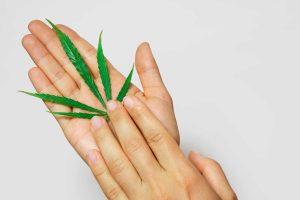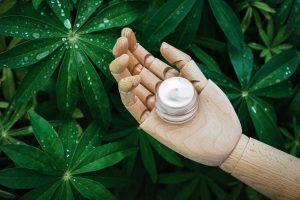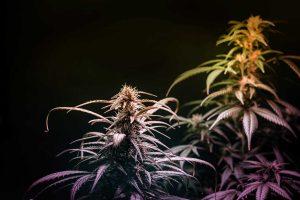- John DiBella
- Published: June 16, 2023
- Fact-checked by Dr. Desiree Granados
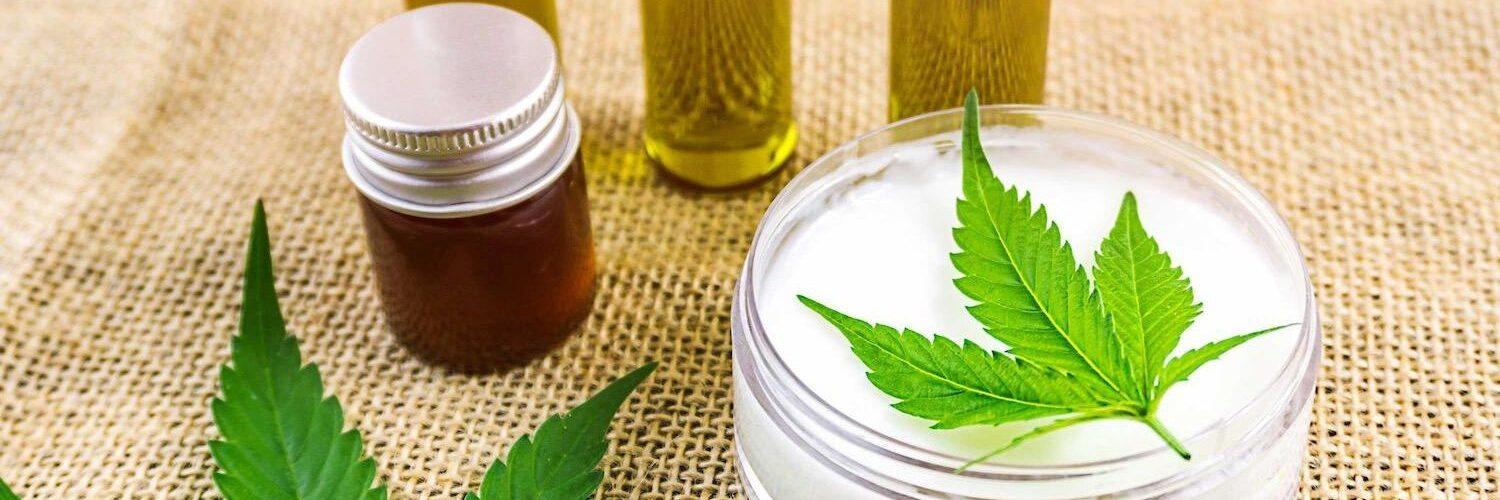
The primary compounds that enable medical marijuana to alleviate the symptoms of various conditions are cannabidiol (CBD) and tetrahydrocannabinol (THC). These substances, which are called cannabinoids, engage the body’s endocannabinoid system (ECS) and initiate chemical reactions that induce cannabis’s palliative effects.
Understanding the active substances in medical marijuana and their key differences will help you determine what types of cannabis products are right for you and prepare you for discussions with your doctor and local dispensary staff members.
Regarding cannabis, we would talk about the terpenes that are known to be more calming, linnable, carifideline, pinene. So I would recommend they look for strings or products where those are the dominant terpenes and probably more importantly, higher CBD strains or at least products with ratios of THC to CBD, so that CBD has more of that calming effect and they don’t get racy from the THC since that’s what we’re literally trying to treat. Regarding cannabis, we would talk about the terpenes that are known to be more calming, linnable, carifiduline, pinene. So I would recommend they look for strings or products where those are the dominant terpenes and probably more importantly, higher CBD strains or at least products with ratio.
The primary compounds that enable medical marijuana to alleviate the symptoms of various conditions are cannabidiol (CBD) and tetrahydrocannabinol (THC). These substances, which are called cannabinoids, engage the body’s endocannabinoid system (ECS) and initiate chemical reactions that induce cannabis’s palliative effects.
Understanding the active substances in medical marijuana and their key differences will help you determine what types of cannabis products are right for you and prepare you for discussions with your doctor and local dispensary staff members.
What Is CBD?
CBD, or cannabidiol, is one of the most prominent chemical compounds found in the cannabis plant. Unlike THC, CBD is not psychoactive and doesn’t produce the “high” associated with cannabis use. Its potential benefits have led it to be widely used in various therapeutic contexts, such as in managing chronic pain and anxiety, as well as in treating conditions like epilepsy.
CBD can be consumed in a variety of forms, including oils, creams or balms, tinctures, edibles, and topicals.
What Is THC?
THC, or delta-9-tetrahydrocannabinol, is the chemical responsible for most of marijuana’s psychological effects. It behaves similarly to the cannabinoid chemicals made naturally by the body and binds to the cannabinoid receptors in the brain. This binding activates the receptors and affects the user’s sensory perception. THC is one of many compounds found in the marijuana plant, but it is the one most often associated with weed’s psychoactive and intoxicating effects.
You can consume THC by smoking or vaping cannabis flower, imbibing teas or tinctures, or eating edibles infused with the compound.
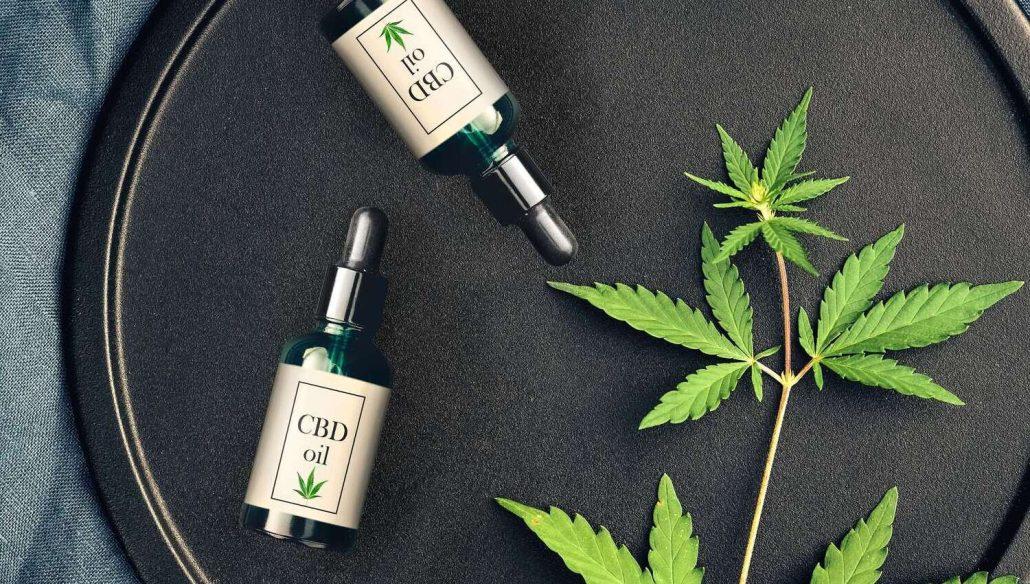
CBD vs. THC: What’s the Difference?
Benefits of CBD
Unlike its psychoactive counterpart, CBD doesn’t produce a “high,” making it an attractive option for those seeking relief from various ailments without the mind-altering effects.
Research suggests that CBD may alleviate chronic pain by influencing endocannabinoid receptor activity, reducing inflammation, and interacting with neurotransmitters. It’s also been indicated to potentially mitigate anxiety and depression thanks to its ability to act on the brain’s serotonin receptors.
Additionally, CBD is being explored as a treatment for neurological disorders like epilepsy and multiple sclerosis, with several studies showing promising results. However, more research is needed to fully understand the extent of CBD’s therapeutic potential.
Benefits of THC
Tetrahydrocannabinol (THC) is known for its psychoactive effects, providing users with the “high” associated with cannabis use. However, beyond its recreational appeal, THC boasts several medical benefits.
For instance, it can act as a powerful analgesic, helping to alleviate chronic pain. THC has also shown potential in treating conditions like neuropathic pain, nausea, and poor appetite in cancer patients. Some research even suggests that THC may have neuroprotective properties, potentially serving as a treatment for neurodegenerative diseases.
Still, even in light of these benefits, it’s crucial to consume THC responsibly considering its psychoactive nature and potential side effects.
Side Effects of CBD
While CBD is generally considered safe, some people may experience side effects. These can include:
- Diarrhea
- Dizziness
- Drowsiness
- Dry mouth
- Fatigue
- Reduced appetite
There’s also a potential for liver damage if CBD is used in high concentrations or for a prolonged period. However, most of these side effects can be avoided by starting with a low dosage and gradually increasing it as necessary.
It’s advisable to consult a healthcare provider before starting or changing a CBD regimen.
Side Effects of THC
While providing certain medicinal benefits, THC use also carries with several side effects. Some of its common physical side effects include:
On the psychological front, it can lead to temporary hallucinations, temporary paranoia, and short-term memory loss, particularly when consumed in high doses.
It’s important to note that these side effects can vary significantly among different individuals, and prolonged cannabis use can lead to more serious health concerns, including addiction. This makes it crucial to consult your doctor before experimenting with any cannabis products.
Are CBD and THC Legal?
In the United States, the legality of CBD and THC varies from state to state and can depend on the type of cannabis product carrying the compounds.
As per federal law, CBD derived from hemp that contains less than 0.3% THC is legal. However, CBD obtained from marijuana is illegal on a federal level, even though it’s legal in certain states.
THC is also federally illegal, but the substance has been legalized for medical and recreational use in nearly half of U.S. states.
The legal landscape surrounding marijuana is constantly changing, which makes it important to stay up to date with your home state’s legislation for the most accurate information about CBD and THC legality.
Why Choose the Sanctuary?
At the Sanctuary Wellness Institute, acquiring your medical marijuana card is a smooth, pain-free process. Our team of certified professionals and licensed medical marijuana doctors is dedicated to providing excellent service and helping you make informed decisions for your health.
If you’re interested in obtaining an MMJ card so you can begin purchasing CBD and THC products from local dispensaries, contact us today.
How we reviewed this article:
- Effects of Cannabis in Parkinson’s Disease: A Systematic Review and Meta-Analysis
https://pubmed.ncbi.nlm.nih.gov/34958046/ - Medicinal Cannabis for Treatment of Chronic Pain
https://www.ncbi.nlm.nih.gov/books/NBK574562/ - CBD for Depression and Anxiety
https://www.webmd.com/cannabinoids/cbd-depression-anxiety - How does marijuana produce its effects?
https://nida.nih.gov/publications/research-reports/marijuana/how-does-marijuana-produce-its-effects - Marijuana and Cancer
https://www.cancer.org/cancer/managing-cancer/treatment-types/complementary-and-integrative-medicine/marijuana-and-cancer.html - Study Reveals How Cannabidiol Counters Epileptic Seizures
https://nyulangone.org/news/study-reveals-how-cannabidiol-counters-epileptic-seizures - Your Guide To CBD Legalization By State
https://www.forbes.com/health/cbd/cbd-legalization-by-state/ - CBD For Pain Relief: How To Use CBD To Manage Pain
https://www.forbes.com/health/cbd/cbd-for-pain/ - A Guide to Marijuana Legalization
https://www.usnews.com/news/best-states/articles/where-is-marijuana-legal-a-guide-to-marijuana-legalization
Current Version
June 16, 2023
Written By
John DiBella
Fact-checked By
Dr. Desiree Granados
Editorial Process
Our Editorial Process

John DiBella is the co-founder and CEO at The Sanctuary Wellness Institute. His goal is to foster healthier lifestyles to improve individuals’ quality of life and health span through online medical and non-medical services. When he’s not writing health & wellness articles for The Sanctuary, he enjoys hiking, camping, surfing and sailing.

